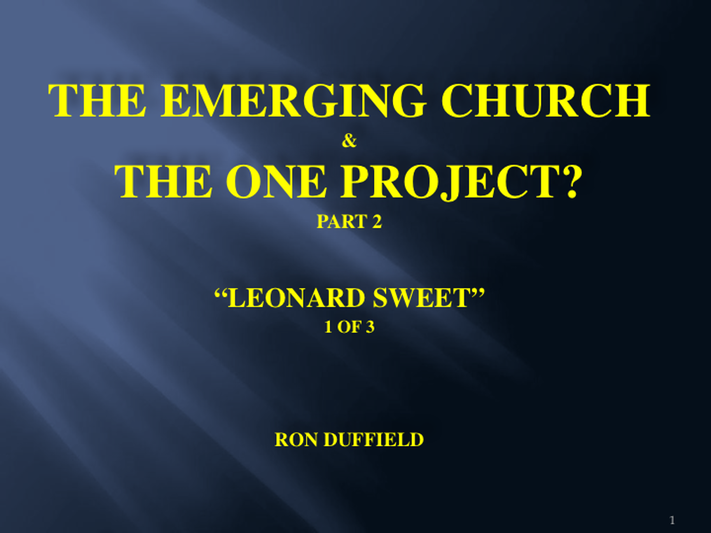
My study into the emerging church started when a pastor back East asked if I knew anything about “The One Project”. When I began to study into the history of the Project and those who started the movement, I was lead to enquire about the Emerging Church and its teachings and history. I found that it deals with much more than just “spiritual formation” and “centering prayer.”
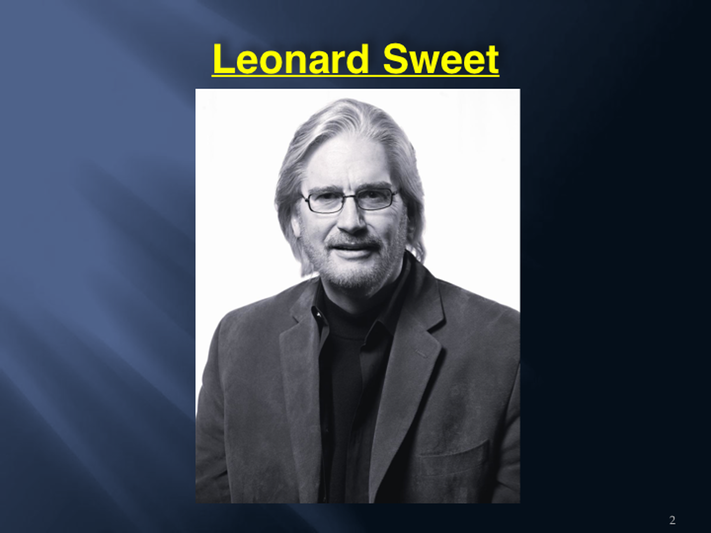
Very distinguished man. Very melodious speaking voice. Sounds very sincere and earnest. Has some legitimate concerns about Christian churches failures, but doesn't see true cause nor true remedy. Certainly doesn't see the three angels message that God’s end time church is to be giving/living in this world.
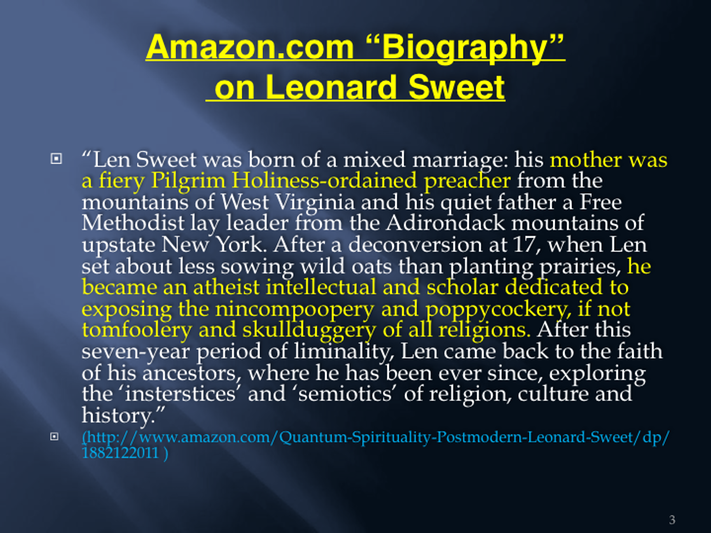
Definition of SEMIOTICS: “a general philosophical theory of signs and symbols.” Leonard Sweet has been the primary person to make this word popular in the Emerging Church movement. He states that he bases it on Matt 16:3 “He answered and said unto them, When it is evening, ye say, It will be fair weather: for the sky is red. And in the morning, It will be foul weather to day: for the sky is red and lowring. O ye hypocrites, ye can discern the face of the sky; but can ye not discern the signs of the times?”
The Greek word is “sēmeion” which means: “an indication, especially ceremonially or supernaturally: - miracle, sign, token, wonder.” Sweet seems to use it as a term that describes himself and his cohorts and followers, who can see the signs in different religions, cultures and histories.
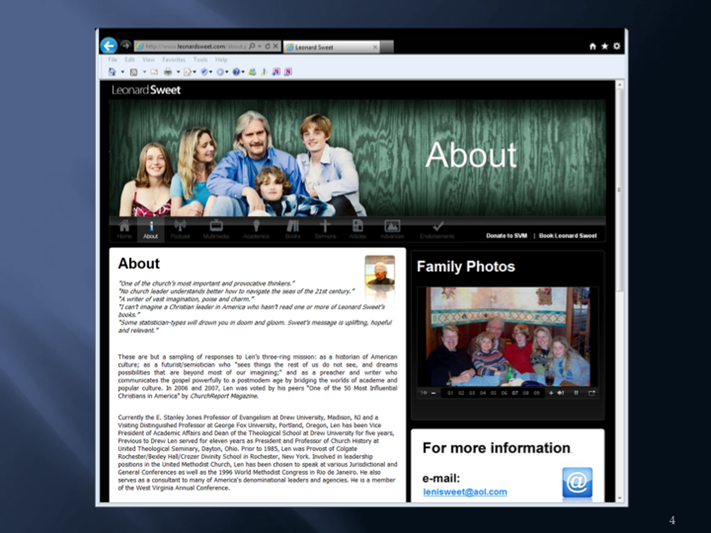
Taken from Leonard Sweet’s own website.
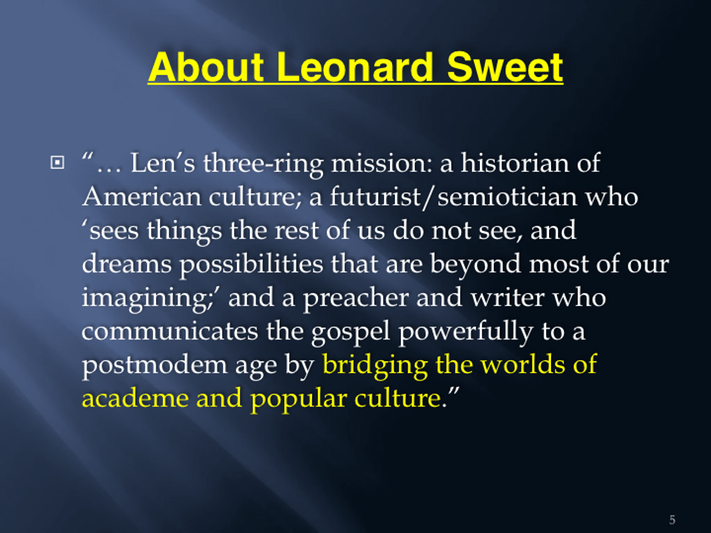
In his own words. A bridge between Education and culture. A big part of Sweet’s vision is passed on through educational institutions.
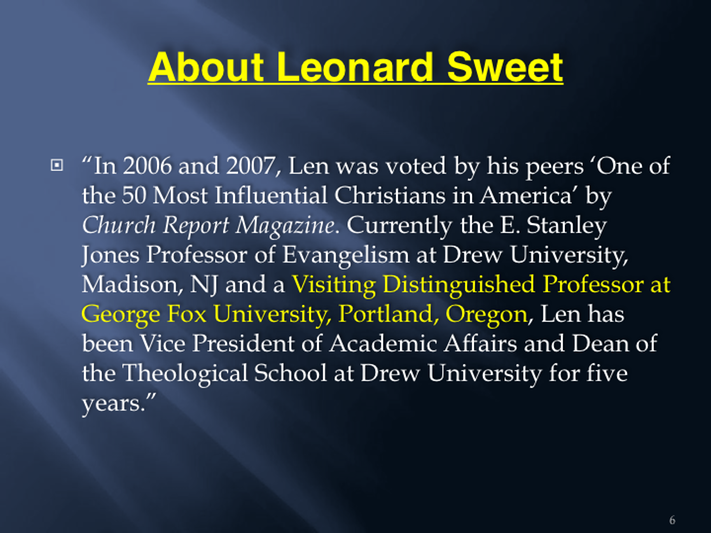
Drew began in the early 1867 as a United Methodist theological seminary in Madison New Jersey. Dr. James Strong (Strong’s Concordance) was published in 1890, during his tenure as Professor of exegetical theology at Drew Theological Seminary. Obviously much has changed since then. We will look later at his work at George Fox University which was founded by Quakers in 1885 and is located in Newberg Oregon, and has centers in Portland, Salem and Boise ID. In 1996, the college merged with Western Evangelical Seminary to form George Fox University. Notable graduates include Richard Foster, and Dan Kimball, both big names in Emerging Church movement.
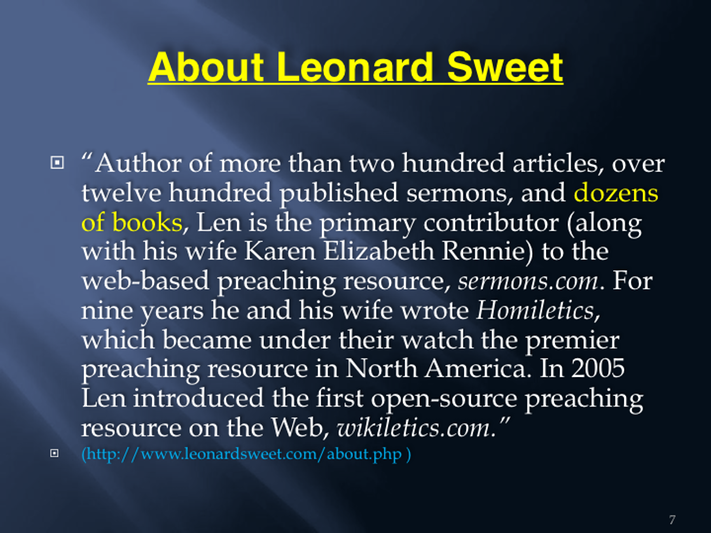
“He is the author of more than forty books, … and over 50 prefaces/forewords to others' books.” http://en.wikipedia.org/wiki/Leonard_Sweet
It would be an understatement to suggest that Leonard Sweet is controversial even in the Evangelical world. Some claim the controversy derives from his dabbling with the New Age and spiritualistic Emerging Church movement.
With over forty books written it seems understandable that someone might take objection to something he has written, and perhaps all the concern is unjustifiable. But one positive aspect of having so many books to pick from is the fact that it is not too difficult to let Sweet speak for himself, and numerous times at that.
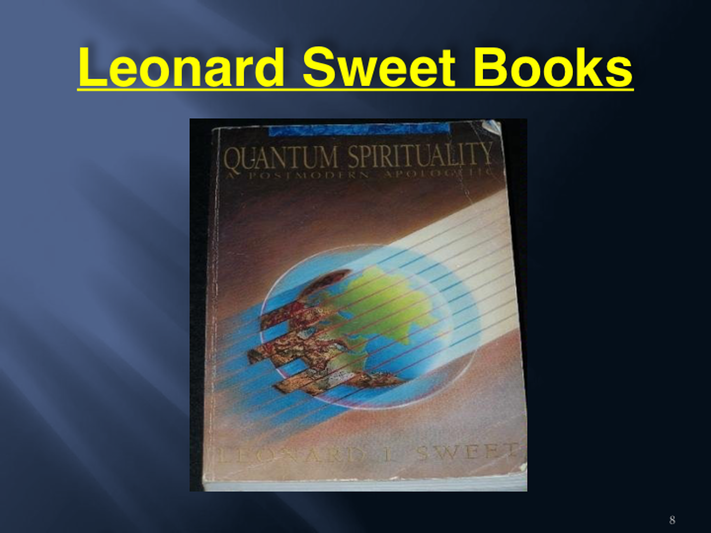
Published in 1991. “This was Len’s ‘coming out’ book as a postmodern disciple after his 1987 knockdown, drag-out Damascus Road encounter with God, who (as he describes it) ‘knocked me off my high academic horse and said, ‘Sweet, are you going to get a mission for the world you wish you had or the world that's actually out there.’” http://disciple21century.com/ECreferencelibrary-Sweeet.htm
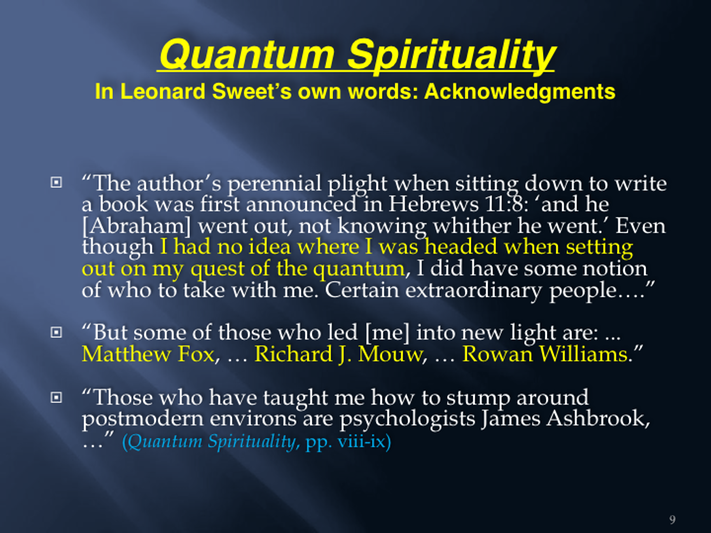
From the “Acknowledgement” Section of the book Sweet thanks many leading New Agers.
Matthew Fox: is an American priest and theologian.[1] Formerly a member of the Dominican Order within the Roman Catholic Church, he is now a member of the Episcopal Church. Fox was an early and influential exponent of a movement that came to be known as Creation Spirituality. The movement draws inspiration from the mystical philosophies of such medieval Catholic visionaries as Hildegard of Bingen, Thomas Aquinas, Saint Francis of Assisi, Julian of Norwich, Dante Alighieri, Meister Eckhart and Nicholas of Cusa, as well as the wisdom traditions of Christian scriptures. Creation Spirituality is also strongly aligned with ecological and environmental movements of the late 20th century and embraces numerous spiritual traditions around the world, including Buddhism, Judaism, Sufism, and Native American spirituality, with a focus on "deep ecumenism". … Fox’s book The Coming of the Cosmic Christ: The Healing of Mother Earth and the Birth of a Global Renaissance delves more into these issues.
More Books: One River, Many Wells: Wisdom Springing from Global Faith; His book on the mysticism of Thomas Aquinas translates many of his works that have never before been translated into English.
Worship: Fox's "Techno Cosmic Masses" (more recently just called "Cosmic Masses") are events that attempt to combine the religious ritual of the Eucharist with dance and multimedia material, deejays, video jockeys and rap music. They evoke and connect spiritual rituals and the ecstatic energy of Techno music and rave parties. They developed from a group called the Nine O'Clock Service in Sheffield, England in the late 1980s and early 1990s and was brought to the United States and further developed by Fox in the mid 1990s.
95 Thesis: In 2005, while preparing for a presentation in Germany and following the naming of Cardinal Ratzinger as Pope Benedict XVI, Fox created 95 theses that he then translated into German. On the weekend of Pentecost, arrangements were made for him to nail these to the door of the Wittenberg church where Martin Luther nailed the original 95 Theses in the 16th century, the act credited as the beginning of the Protestant Reformation.[1][16] The action fueled the creation of a lively blog involving tens of thousands of Germans. In his theses, Fox called for a new reformation in Western Christianity. In his supporting book, A New Reformation, Fox argued that two Christianities already exist and it is time for a new reformation to acknowledge that fact and move the Western spiritual tradition into new directions. Fox is also supportive of homosexuality.
Richard J. Mouw: is an American theologian and philosopher. He is currently President at Fuller Theological Seminary, where he also holds the post of Professor of Christian Philosophy. Dialogue with Catholics: In 2009, he signed a public statement encouraging all Christians to "read, wrestle with, and respond to Caritas in Veritate", the social encyclical by Pope Benedict XVI.
Rowan Williams: Rowan Williams is an Anglican bishop, poet and theologian. He was the 104th and current Archbishop of Canterbury. He is anti-creationist, pro-evolutionist, pro-homosexuality. He has written on Saint Teresa of Avila, a Spanish Roman Catholic mystic. He is active in the ecumenical movement and seeking reunion of the Church of England and Rome.
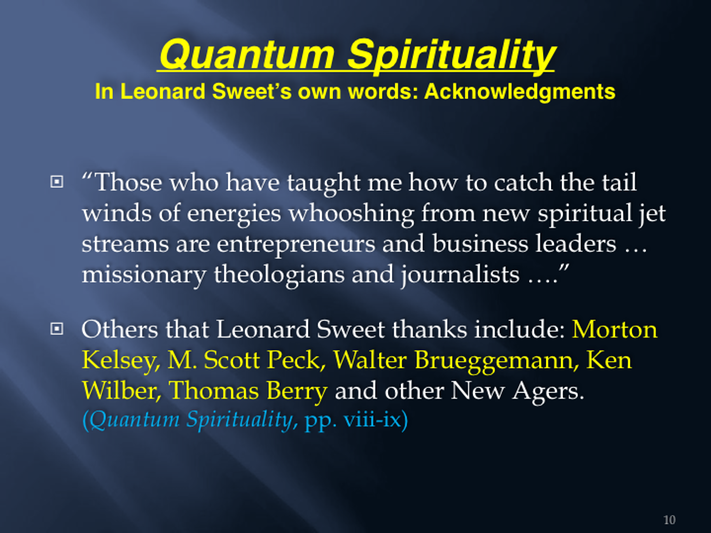
Pantheism runs through all of these authors. Look up the word with any of these names.
Morton Kelsey: author of over 30 books, and Episcopal priest, pro-homosexuality, charismatic Christian, is into new forms of worship and meditation: Dreams: A Way to Listen to God; Healing and Christianity; The Other Side of Silence: Meditation for the Twenty-first Century; Companions On The Inner Way: The Art of Spiritual Guidance; Adventure Inward; Transcend: A Guide to the Spiritual Quest; Dreamquest: Native American Myth and the Recovery of Soul. Draws on the works of Ignatius Loyola and contemplative prayer practices.
M. Scott Peck: Christian/New Age thought. Wrote the book The Road Less Traveled, sold 10 million copies. "All of us who postulate a loving God and really think about it eventually come to a single terrifying idea: God wants us to become Himself (or Herself or Itself). We are growing toward godhood. God is the goal of evolution." [page 270] “To put it plainly, our unconscious is God. God within us. We were part of God all the time. God has been with us all along, is now, and always will be.“ [p. 281]
Walter Brueggemann: is an American Protestant Old Testament scholar and theologian and an important figure in Progressive Christianity. Brueggemann is widely considered one of the most influential Old Testament scholars of the last several decades. Brueggemann is an advocate and practitioner of rhetorical criticism. He has written more than 58 books, hundreds of articles, and several commentaries on books of the Bible. Dr. Brueggemann is known throughout the world for his method of combining literary and sociological modes when reading Bible. An ordained minister in the United Church of Christ, Dr. Brueggemann currently resides in Cincinnati, Ohio (2008). United church of Christ is more liberal in views of ecumenism, equal rights, etc.
Ken Wilber: is an American author who has written about mysticism, philosophy, ecology, and developmental psychology. His work formulates what he calls Integral Theory. Very much into spiritualism/New Age thought, lived in Boulder CO while writing some of his books, he is into Buddhist meditation. Books include: The Spectrum of Consciousness; Sex, Ecology, Spirituality; Up from Eden: A Transpersonal View of Human Evolution; Spiritual Choices: The Problem of Recognizing Authentic Paths to Inner Transformation; Transformations of Consciousness: Conventional and Contemplative Perspectives on Development .
Thomas Berry: was a Catholic priest of the Passionist order, cultural historian and ecotheologian (although cosmologist and geologian — or “Earth scholar” — were his preferred descriptors). Among advocates of deep ecology and "ecospirituality" he is famous for proposing that a deep understanding of the history and functioning of the evolving universe is a necessary inspiration and guide for our own effective functioning as individuals and as a species. Books include: Buddhism (1968) The Religions of India (1972) The Dream of the Earth (1988) Befriending the Earth (with Thomas Clarke, 1991).
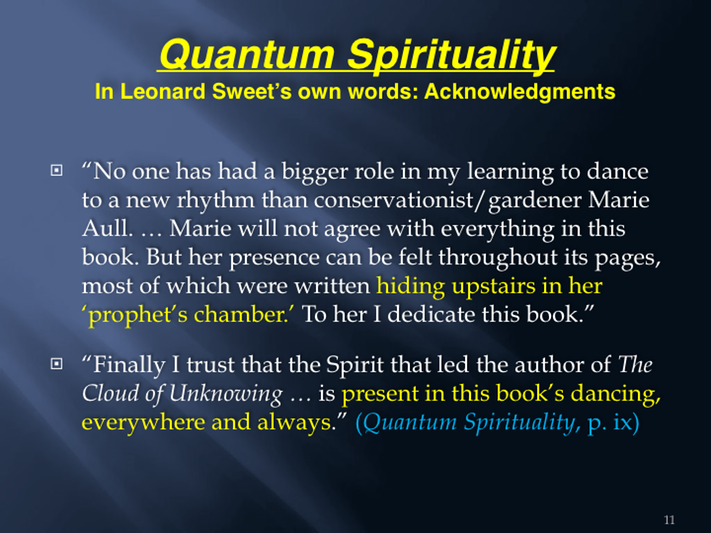
Maria Aull was a wealthy widow who was an environmentalist/conservationist and donated a large amount of her estate (money and land) near Dayton, Ohio, to the National Audubon Society to be used for an environmental education program to promote the protection of birds, wildlife and the habitats on which they depend. She lived to 105, seems to have been a lovely person with a love for nature and desire to share that love with others. Sweet however, used these gardens as a site for his book writing where he developed his ‘one with the earth’ ideas.
Explanation for the Cloud of Unknowing on next slide
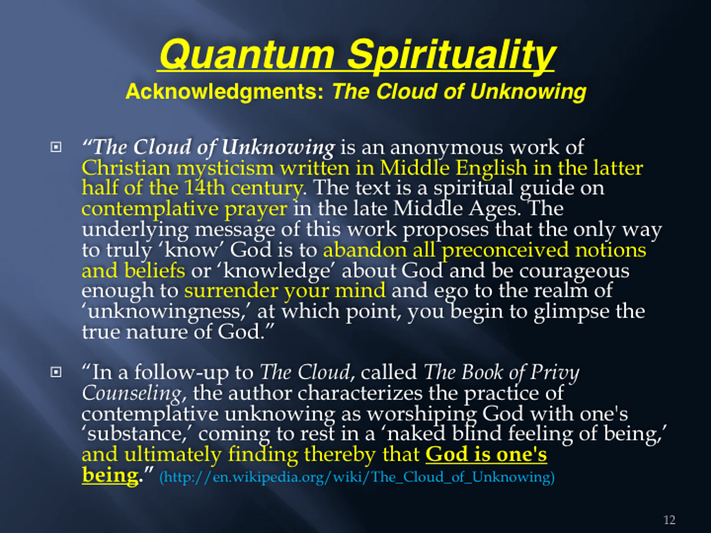
(End of Acknowledgement states very clearly the mystical, contemplative connection to which Sweet hopes the same spirit guided him).
We have not even made it into the main text of the book and it should be clear that “Quantum Spirituality” is a new age/spiritualistic emerging church book.
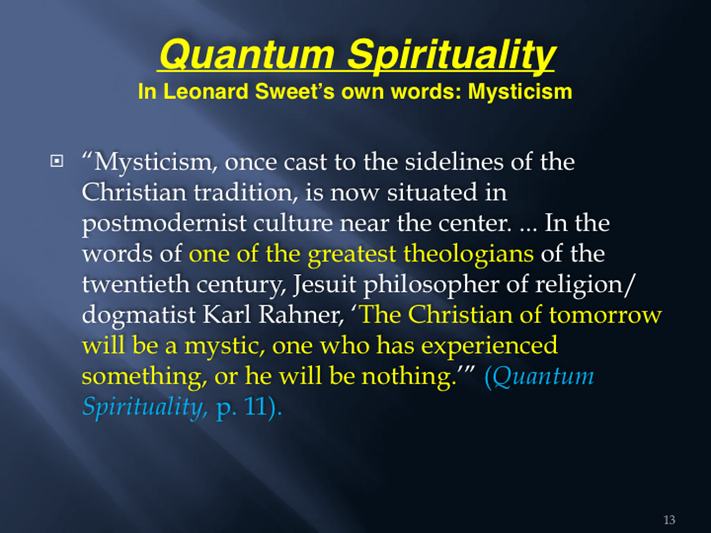
Now we will look more specifically at Sweet’s own words form the book “Quantum Spirituality”. Sweet also quotes often from Catholic mystics for support of his ideas:
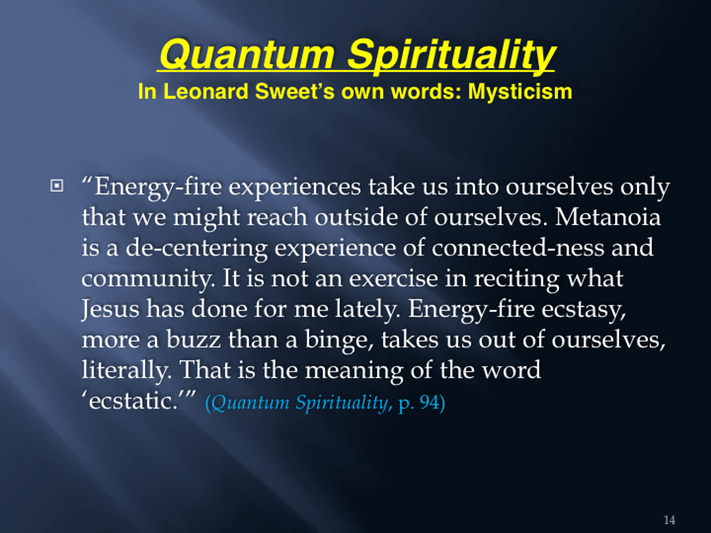
Say What? If none of that really made sense to you that’s okay. The entire book is filled with similar “philosophy.”
EGW said we should not present arguments of Pantheism to expose it or try to enter into conflict with them [Kellogg], but she did say there was a time to meet and expose it, and she did give short statements to describe their teachings in GC. Thus we will mention only briefly Sweet’s specific pantheistic statements in the following two slides.
“I am warned that the less our ministers handle the subject of pantheism, the less they will help Satan to present his theories to the people. Let the truth for this time be kept before them. Never, never repeat the spiritualistic sentiments, the strange, misleading theories, which have for years been coming in. … Let the repetition of Satan's falsehoods be kept out of our papers.” (Counsel to Editors and Writers, p. 93)
“I am instructed to say to you that it is not best to dwell upon the spiritualistic sentiments, the strange, misleading theories, which have for years been coming in among us.
It is not best to preach on the subject of Pantheism or to read quotations from authors who write on this subject, and the specious, deceptive errors that lead to it. The statements made in Testimonies, volume 8, are sufficient to warn our people to avoid these errors. These statements will do more to enlighten minds than all the explanations or theories that our ministers and teachers may put forth concerning these matters.
If you try to handle these subjects, you will be led to repeat the sophistries of Satan, and thus you will help Satan to present his false theories to the people.” (Evangelism, p. 63)[Specific context was in regard to Kellogg crisis]
GC and example of how to cover the topic without giving voice to Satan by dwelling on it.
“Spiritualism teaches ‘that man is the creature of progression; that it is his destiny from his birth to progress, even to eternity, toward the Godhead,’ And again: ‘Each mind will judge itself and not another.’ ‘The judgment will be right, because it is the judgment of self. . . . The throne is within you.’ Said a Spiritualistic teacher, as the ‘spiritual consciousness’ awoke within him, ‘My fellow-men, all were unfallen demigods.’ And another declares, ‘Any just and perfect being is Christ.’ (Great Controversy, 1888 ed., p. 554)
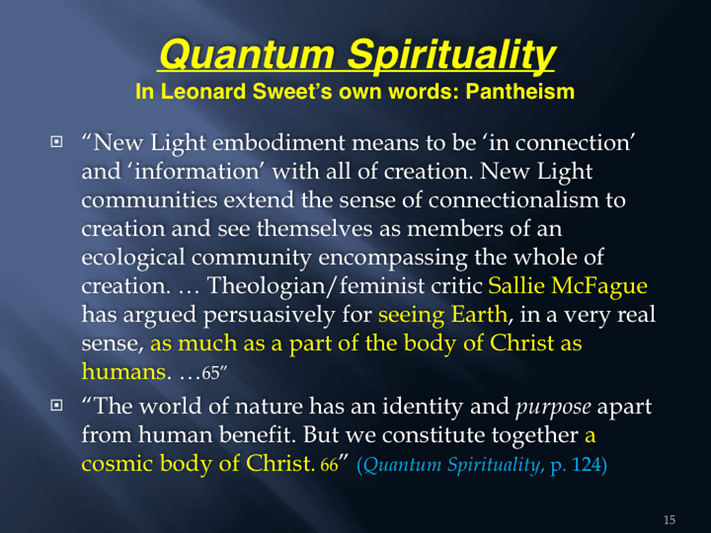
“Sallie McFague is an American feminist Christian theologian, best known for her analysis of how metaphor lies at the heart of how we may speak about God. She has applied this approach in particular to ecological issues, writing extensively on care for the earth as if it were God’s ‘body’.”
“McFague’s panentheistic theology stresses God as highly involved in the world … This is not the omnipotent, omniscient and immutable God of classical theism and neo-orthodoxy: for McFague, God is not transcendent in any sense that we can know. This has led some critics to ask whether McFague’s theology leaves us with anything that may properly be called God at all. … A theology where God as creator does not stand ‘over against’ the creation tends to shift the focus away from God as personal. … God as Spirit is not primarily the initiator of creation, but ‘the empowering, continuing breath of life’. … And because the world is God’s body, evil occurs in and to God as well as to us and the rest of creation.[22]
Correspondingly, the notion of the individual in need of God’s salvation is anachronistic in a world ‘from’ which that individual no longer need to be saved, but rather ‘in’ which he or she need to learn how to live interrelatedly and interdependently.”
“McFague remarks, ‘theology is mostly fiction’,[3][4] but a multiplicity of images, or metaphors, can and should enhance and enrich our models of God. Most importantly, new metaphors can help give substance to new ways of conceiving God appropriately ‘for our time’, and more adequate models for the ethically urgent tasks humankind faces, principally the task of caring for an ecologically fragile planet.” (http://en.wikipedia.org/wiki/Sallie_McFague)
[66] is referencing Matthew Fox, The Cosmic Christ: The Coming of the Cosmic Christ: The Healing of Mother Earth and the Birth of a Global Renaissance (San Francisco: Harper and Row, 1988).“Former Dominican priest and author of The Coming of the Cosmic Christ; developed Creation Spirituality; believes that God and Christ are in all things. He is president of the University of Creation Spirituality.” (http://www.lighthousetrailsresearch.com/matthewfox.htm)
Pantheism is a word derived from the Greek (pan) meaning "all" and the Greek (theos) meaning "God". It is the view that everything is part of an all-encompassing immanent God,[1] or that the Universe (or Nature) and God (or divinity) are identica. “God is everything and everything is God.”
Panentheism (from Greek πᾶν (pân) "all"; ἐν (en) "in"; and θεός (theós) "God"; "all-in-God“ [or God in all]) is a belief system which posits that the divine (be it a monotheistic God, polytheistic gods, or an eternal cosmic animating force), interpenetrates every part of nature and timelessly extends beyond it. Panentheism differentiates itself from pantheism, which holds that the divine is synonymous with the universe.[1]
In panentheism, the universe in the first formulation is practically the whole itself. In the second formulation, the universe and the divine are not ontologically equivalent. In panentheism, God is viewed as the eternal animating force behind the universe. Some versions suggest that the universe is nothing more than the manifest part of God. In some forms of panentheism, the cosmos exists within God, who in turn "pervades" or is "in" the cosmos. While pantheism asserts that 'All is God', panentheism goes further to claim that God is greater than the universe. In addition, some forms indicate that the universe is contained within God.[1] Much Hindu thought is highly characterized by panentheism and pantheism.
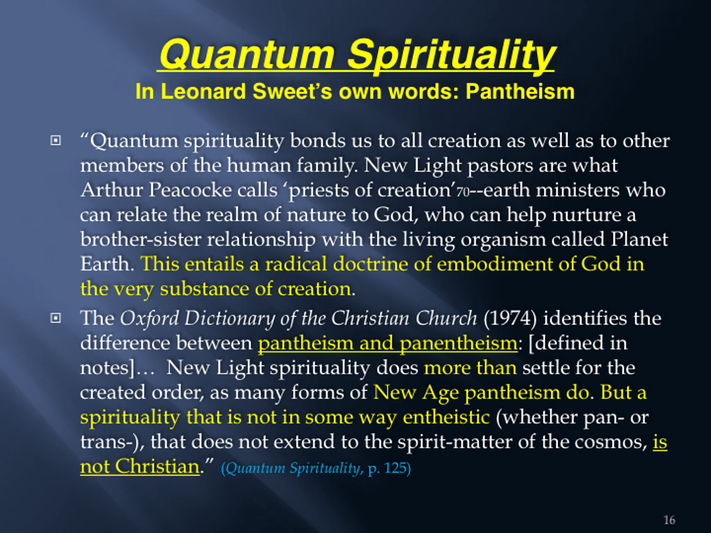
“Pantheism is the pagan belief that ‘ALL is God.’ Panentheism is its twin that says, ‘God is In everyone and everything.’ The Quakers—like the Hindus, Buddhists, and New Agers—are panentheists.” (Howard Peth, The Dangers of Contemplative Prayer, p. 50)
[Pantheism is “the belief or theory that God and the universe are identical”; panentheism is “the belief that the Being of God includes and penetrates the whole universe, so that every part of it exists in Him, but. . . that His Being is more than, and is not exhausted by, the Universe.”77] The Oxford Dictionary of the Christian Church (1974)
Transentheistic: “Transtheistic is a term coined by phr Paul Tillich or I Heinrich Zimmer, refeor religious philosophy w
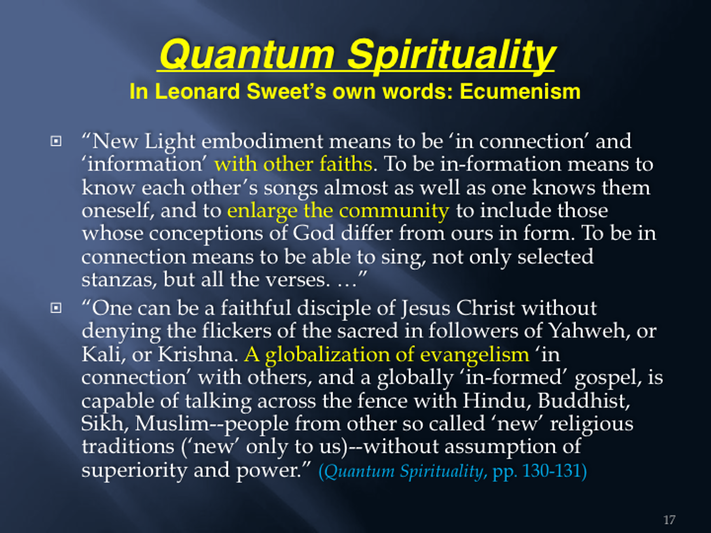
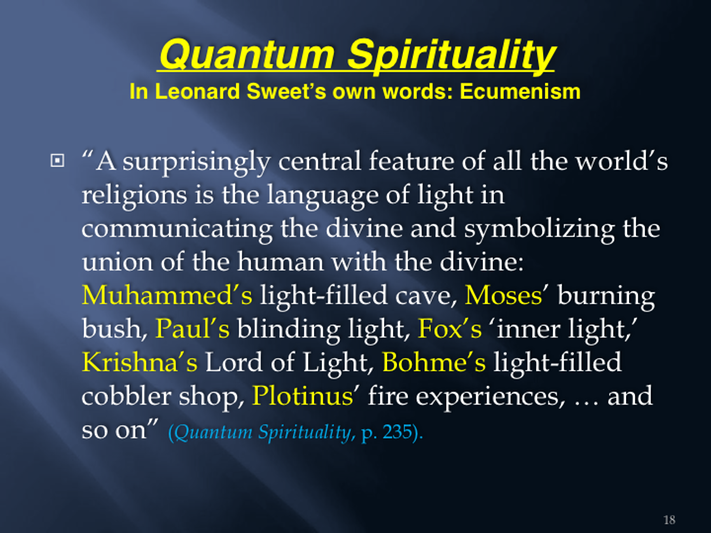
Is all light the same?
2Co 11:13 -15 “For such are false apostles, deceitful workers, transforming themselves into the apostles of Christ.
And no marvel; for Satan himself is transformed into an angel of light. Therefore it is no great thing if his ministers also be transformed as the ministers of righteousness; whose end shall be according to their works.”
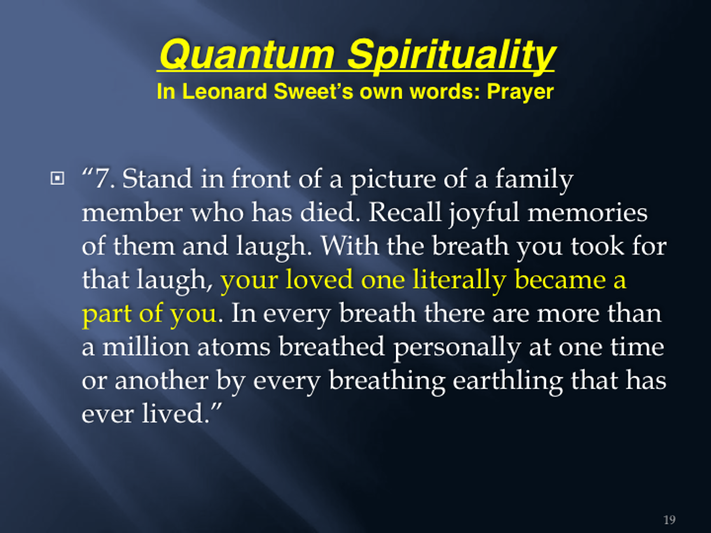
Perhaps one of the more revealing sections of this book is where Sweet offers 10 recommendations for breathing exercises: “The literal translation of aerobics is ‘with air.’ These ten deep breathing exercises sample some of the aerobic principles able to improve the physical fitness of postmoderns.”
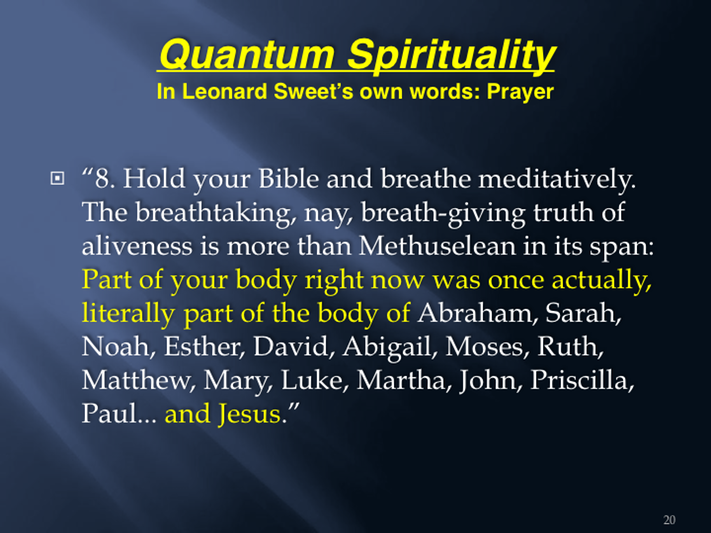
continued
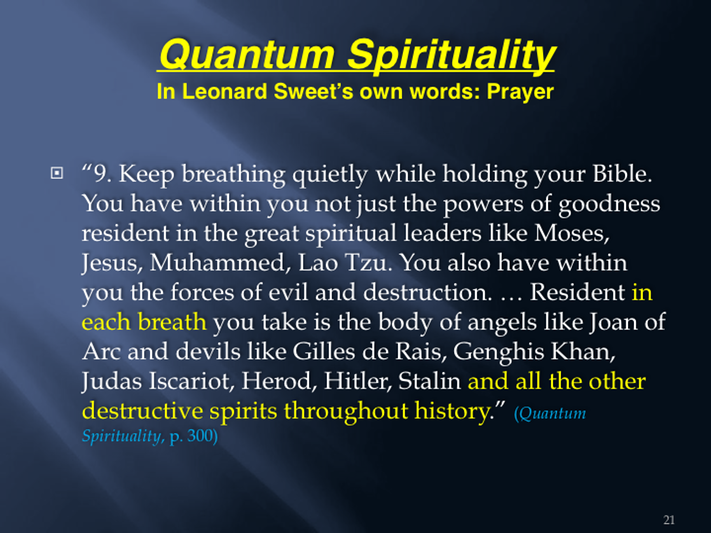
An entire book could be written in response to Quantum Spirituality, and to all of Sweet’s books for that matter, but that is far beyond the scope of this presentation. Many other Evangelicals have responded to Sweet’s concepts over the years, raising a warning call to the ever growing ecumenical, spiritualistic, Emerging Church movement he is involved in. Where are Adventists today? But some might say that Sweet wrote Quantum Spirituality at the beginning of his ministry years ago, and that he has substantially changed over the years refuting some of his earlier questionable concepts. Not true as we shall see.
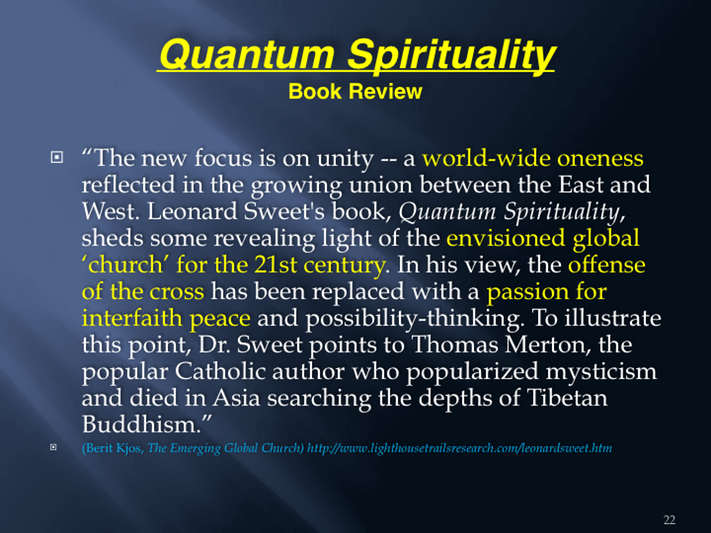
Female author, with Lutheran upbringing, written a lot on trends in world religion and the move toward One World government.
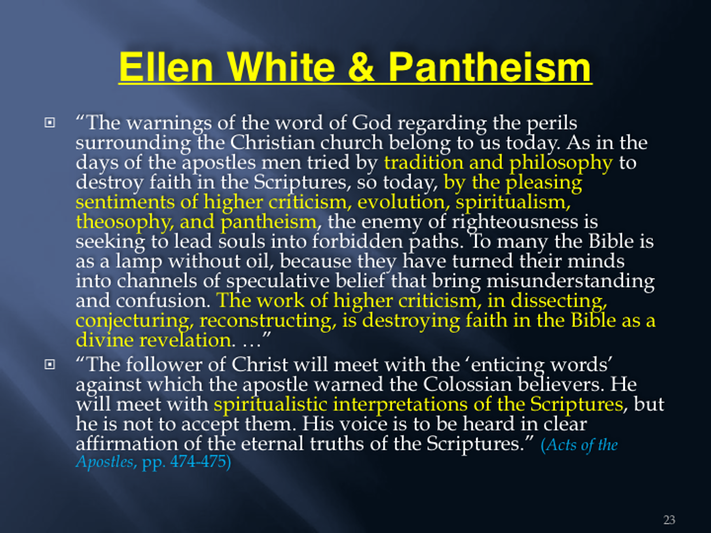
Before moving on to more of Leonard Sweet’s theology we should remind ourselves of God’s warnings to us as a people.
What does Ellen White through the Testimony of Jesus have to say about our times?
Just because someone quotes scripture does not prove it right. Satan quoted scripture to Christ.
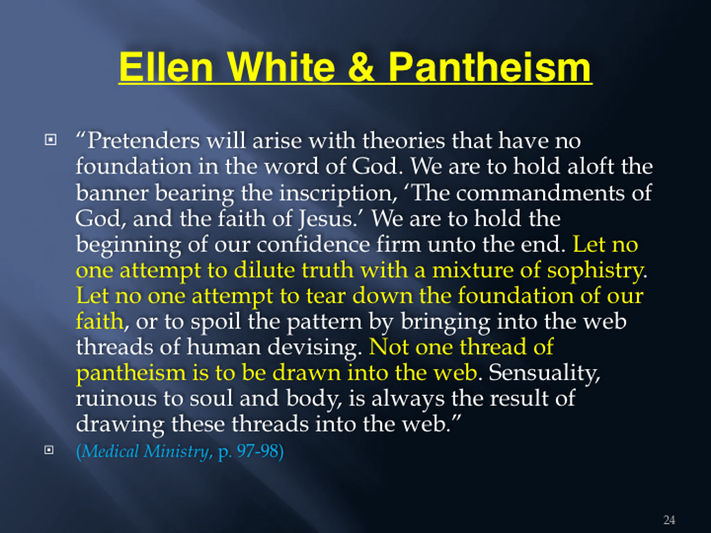
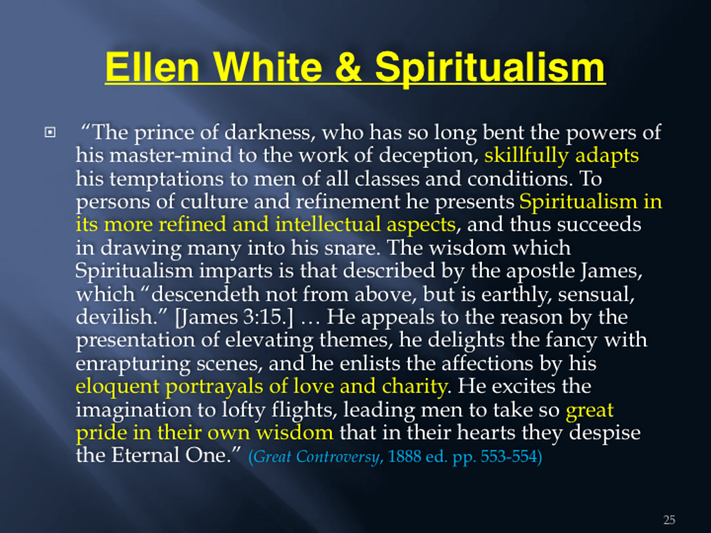
From chapter 34 of 1888 Great Controversy is titled “Spiritualism.”
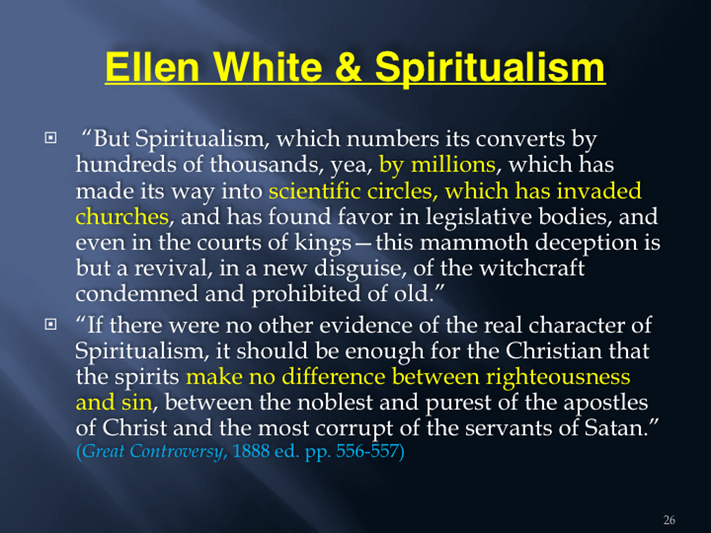
From chapter 34 of 1888 Great Controversy is titled “Spiritualism.”
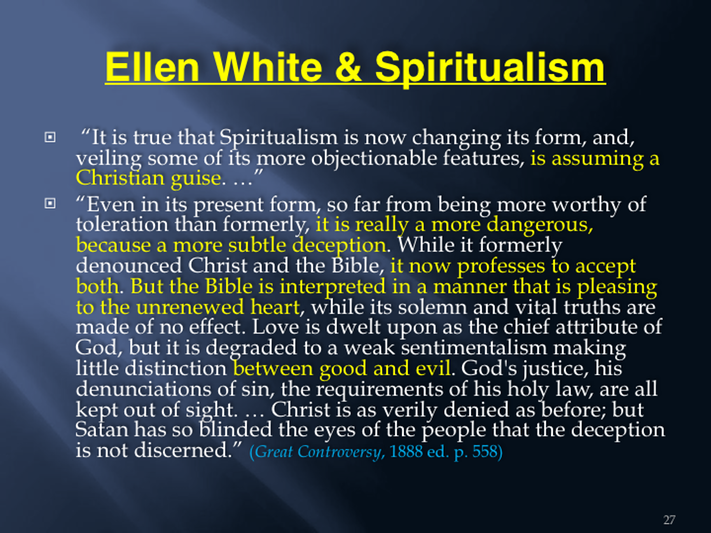
From chapter 34 of 1888 Great Controversy is titled “Spiritualism.”
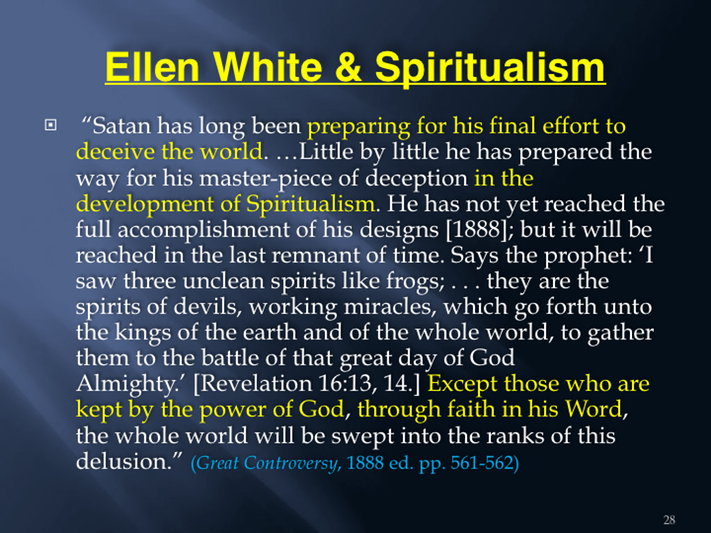
From chapter 34 of 1888 Great Controversy is titled “Spiritualism.”
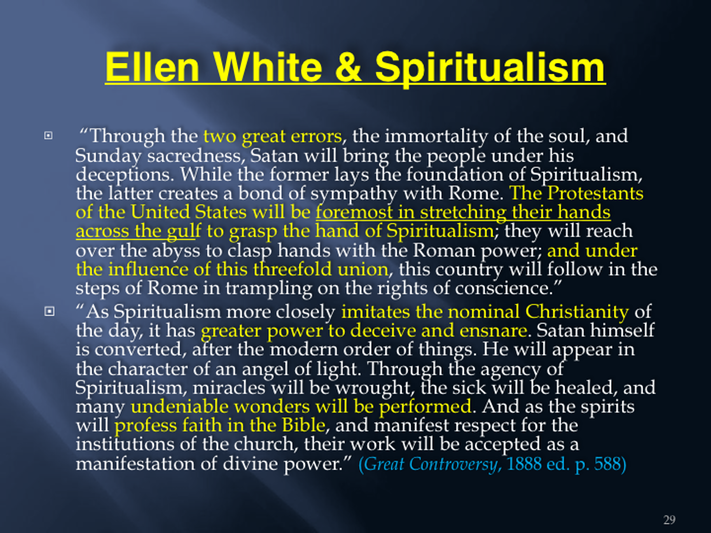
Protestants will reach across first to grab spiritualism, then Roman power.
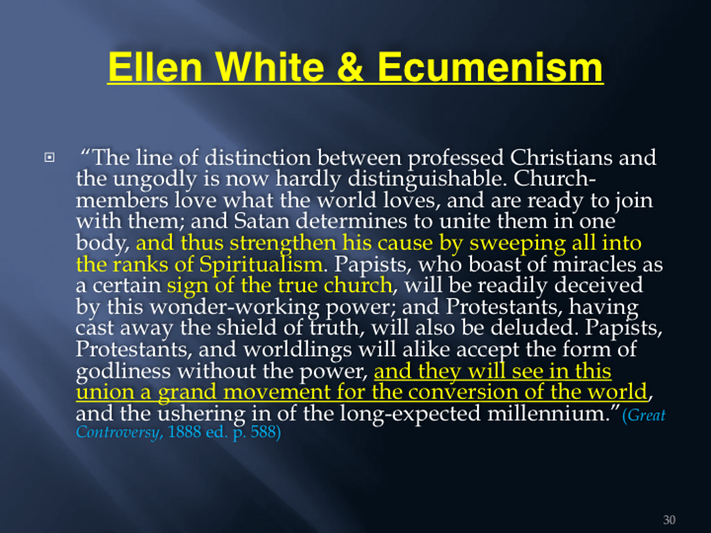
Ecumenical movement.